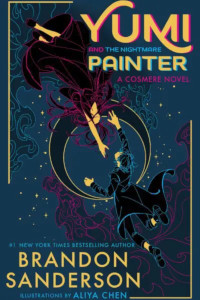
Yumi and the Nightmare Painter by Brandon Sanderson.
I really liked this book because it introduces some new concepts which are important for the overarching history of the Cosmere. I believe that, to truly enjoy it, you must read all the other Cosmere books by Sanderson, or do a re-read after you’ve done that.
Highlights
Like a man with diarrhea in a sandpaper factory, sometimes all available options are less than ideal. — p. 34
IT’S A COMMON mistake to assume that someone is weak because they are accommodating. If you think this, you might be the type who has no idea how much effort—how much strength—it takes to put up with your nonsense. — p. 60
Trauma doesn’t decrease with company, but it does grow easier to work through when you know someone else understands. — p. 75
There’s nothing wrong with being a tad awkward. It is a sign of a new experience—and new experiences are among the cosmere’s best forms of emotional leavening. We shouldn’t be so afraid of showing inexperience. Cynicism isn’t interesting; it is often no more than a mask we place over tedium. — p. 77
“It’s all right,” she whispered. “I know you’re trying. That’s what matters.” Pay attention. At times, this is what heroism looks like. — p. 247
It’s said that everything you eat, even the air you breathe, becomes part of you. The axi that make up the matter you take in come to make up you instead. I, however, find that the moments we take into our souls as memories are far more important than what we eat. — p. 279
Hope is a grand thing, and having heroes is essential to human aspiration. That is part of why I tell these stories. That said, you do need to learn to separate the story—and what it has done to you—from the individual who prompted it. Art—and all stories are art, even the ones about real people—is about what it does to you. The true hero is the one in your mind, the representation of an ideal that makes you a better person. — p. 348
He wasn’t anyone special, at least on paper. Yes, he was of above-average painting skill, but that wasn’t what drew the attention of the spirit. Instead it was the fact that he saved the life of a young boy. Turns out that was enough; the spirit found in him the soul of a hero. It wasn’t the boasts, the pretending, the superficial actions. It was the fact that when he could have just headed home to relax, he’d instead turned back. To protect the people of Kilahito, even when he didn’t feel like it. — p. 359
Things only have the value we give to them. And likewise, actions can be worth whatever we decide them to be worth. — p. 389